Investigating the Impact of Early Childhood Music Education
VerifiedAdded on 2021/01/03
|13
|3848
|276
Report
AI Summary
This report investigates the impact of early childhood music education on children's development. It explores the background and significance of music in early learning, addressing research questions about its roles, impacts, and benefits. The literature review covers themes such as the role of music in child development and the influence of music on language and listening skills, supported by various scholars. The research methodology outlines the approach, including data collection tools and ethical considerations. The study aims to improve motor skills, language skills, and overall development, highlighting the importance of music for cognitive, social, and emotional growth. The report also discusses the benefits of music, such as improved academic and physical skills, enhanced self-esteem, and vocabulary development. The conclusion emphasizes the positive effects of music education and the importance of early exposure to music for children's overall well-being.
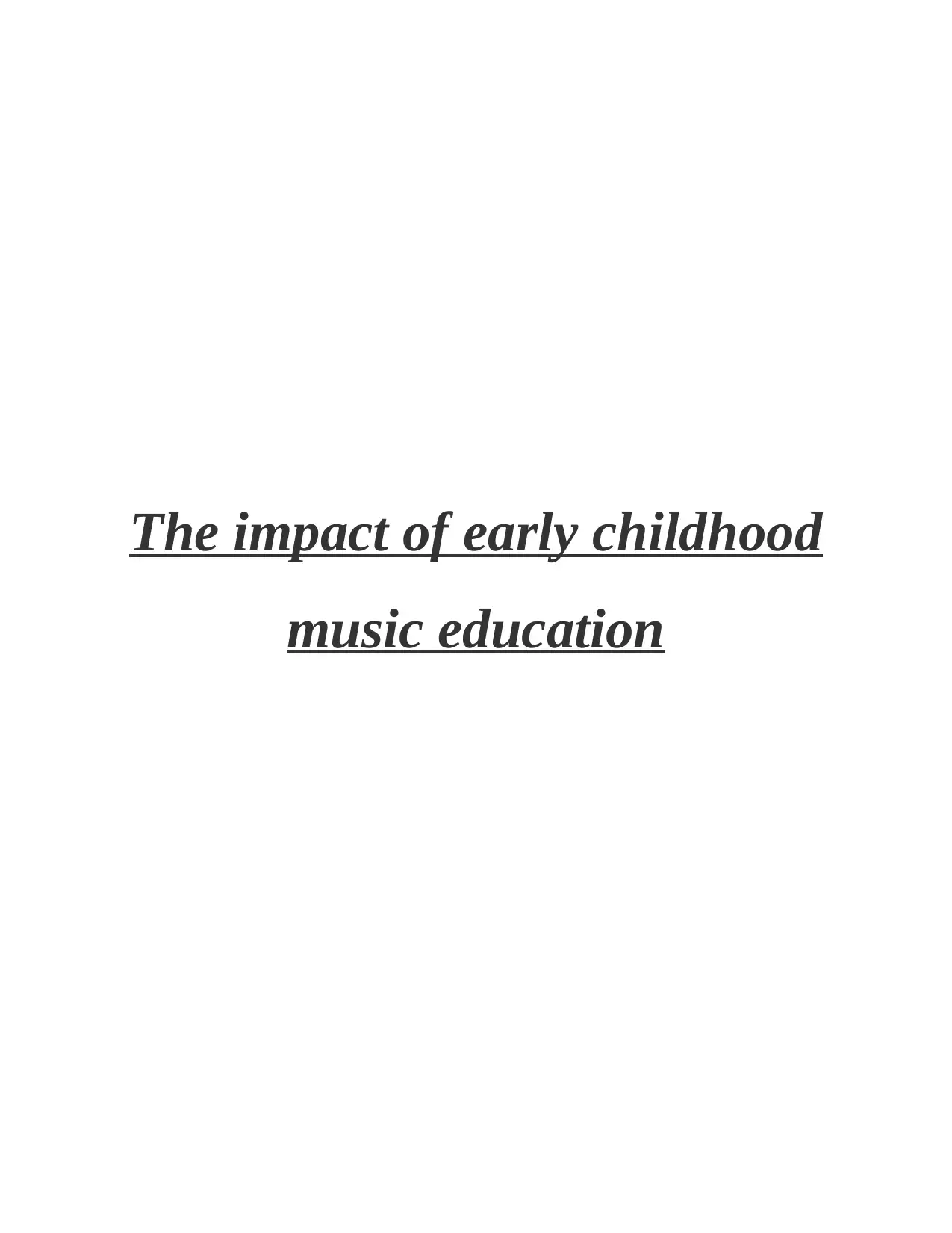
The impact of early childhood
music education
music education
Paraphrase This Document
Need a fresh take? Get an instant paraphrase of this document with our AI Paraphraser
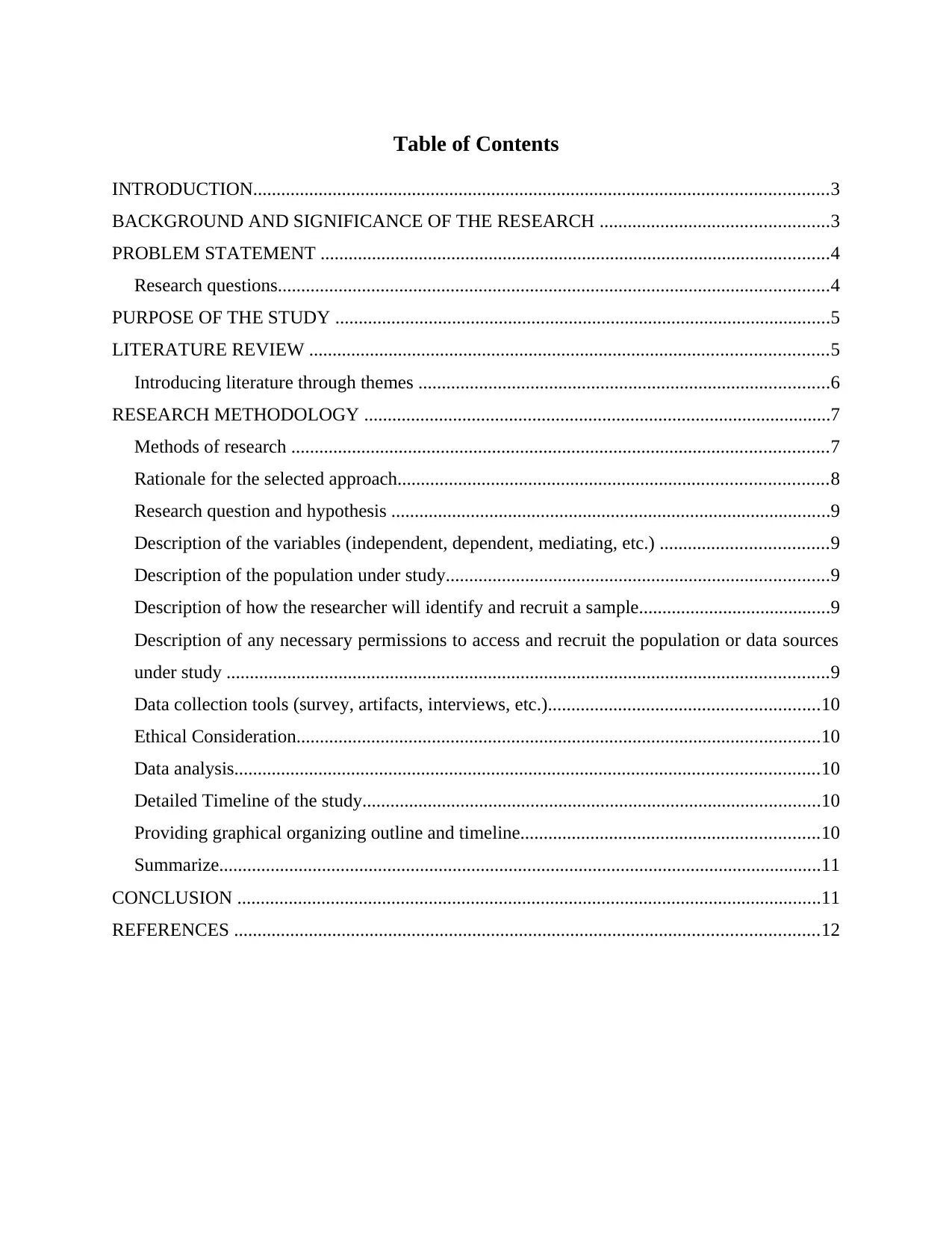
Table of Contents
INTRODUCTION...........................................................................................................................3
BACKGROUND AND SIGNIFICANCE OF THE RESEARCH .................................................3
PROBLEM STATEMENT .............................................................................................................4
Research questions......................................................................................................................4
PURPOSE OF THE STUDY ..........................................................................................................5
LITERATURE REVIEW ...............................................................................................................5
Introducing literature through themes ........................................................................................6
RESEARCH METHODOLOGY ....................................................................................................7
Methods of research ...................................................................................................................7
Rationale for the selected approach............................................................................................8
Research question and hypothesis ..............................................................................................9
Description of the variables (independent, dependent, mediating, etc.) ....................................9
Description of the population under study..................................................................................9
Description of how the researcher will identify and recruit a sample.........................................9
Description of any necessary permissions to access and recruit the population or data sources
under study .................................................................................................................................9
Data collection tools (survey, artifacts, interviews, etc.)..........................................................10
Ethical Consideration................................................................................................................10
Data analysis.............................................................................................................................10
Detailed Timeline of the study..................................................................................................10
Providing graphical organizing outline and timeline................................................................10
Summarize.................................................................................................................................11
CONCLUSION .............................................................................................................................11
REFERENCES .............................................................................................................................12
INTRODUCTION...........................................................................................................................3
BACKGROUND AND SIGNIFICANCE OF THE RESEARCH .................................................3
PROBLEM STATEMENT .............................................................................................................4
Research questions......................................................................................................................4
PURPOSE OF THE STUDY ..........................................................................................................5
LITERATURE REVIEW ...............................................................................................................5
Introducing literature through themes ........................................................................................6
RESEARCH METHODOLOGY ....................................................................................................7
Methods of research ...................................................................................................................7
Rationale for the selected approach............................................................................................8
Research question and hypothesis ..............................................................................................9
Description of the variables (independent, dependent, mediating, etc.) ....................................9
Description of the population under study..................................................................................9
Description of how the researcher will identify and recruit a sample.........................................9
Description of any necessary permissions to access and recruit the population or data sources
under study .................................................................................................................................9
Data collection tools (survey, artifacts, interviews, etc.)..........................................................10
Ethical Consideration................................................................................................................10
Data analysis.............................................................................................................................10
Detailed Timeline of the study..................................................................................................10
Providing graphical organizing outline and timeline................................................................10
Summarize.................................................................................................................................11
CONCLUSION .............................................................................................................................11
REFERENCES .............................................................................................................................12
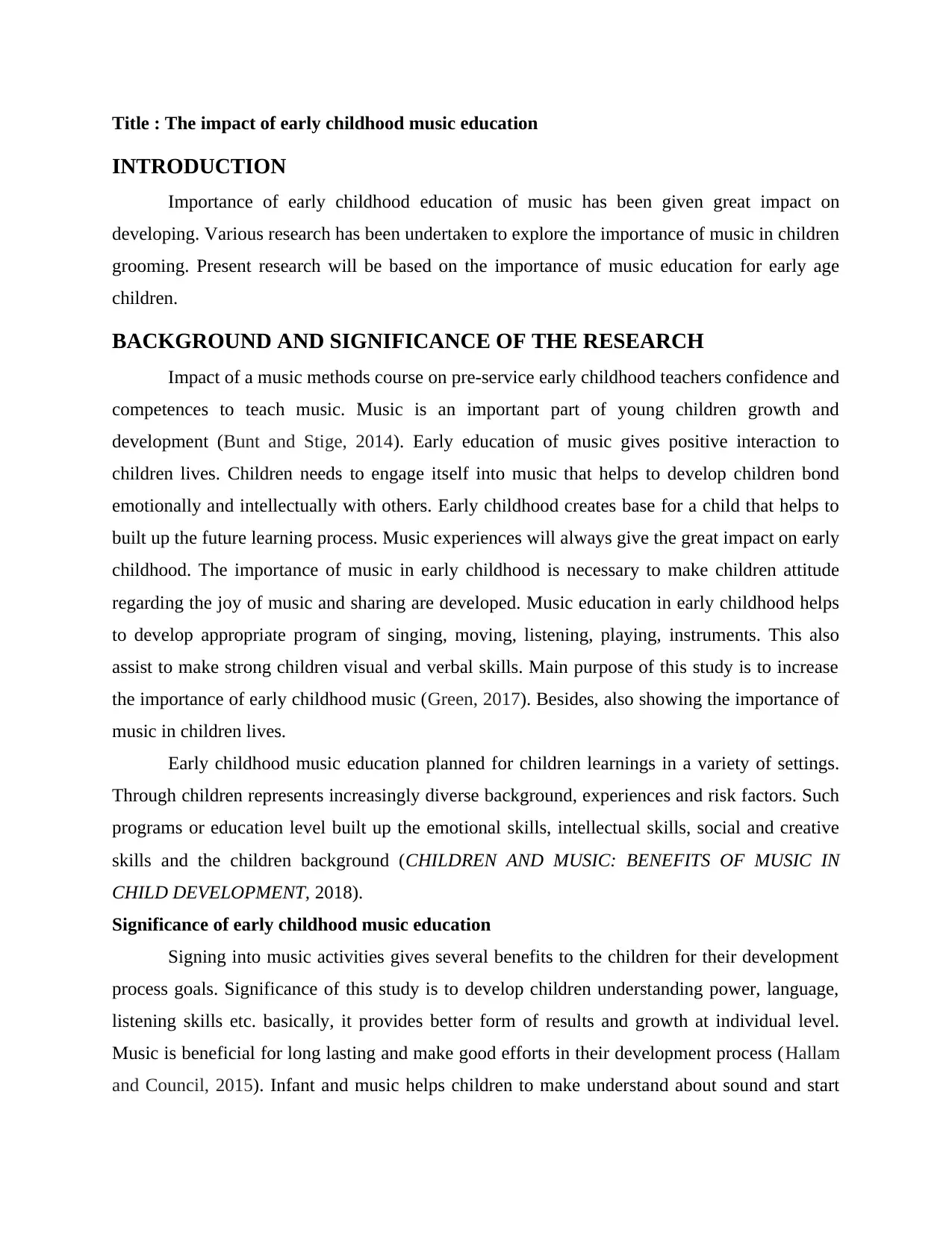
Title : The impact of early childhood music education
INTRODUCTION
Importance of early childhood education of music has been given great impact on
developing. Various research has been undertaken to explore the importance of music in children
grooming. Present research will be based on the importance of music education for early age
children.
BACKGROUND AND SIGNIFICANCE OF THE RESEARCH
Impact of a music methods course on pre-service early childhood teachers confidence and
competences to teach music. Music is an important part of young children growth and
development (Bunt and Stige, 2014). Early education of music gives positive interaction to
children lives. Children needs to engage itself into music that helps to develop children bond
emotionally and intellectually with others. Early childhood creates base for a child that helps to
built up the future learning process. Music experiences will always give the great impact on early
childhood. The importance of music in early childhood is necessary to make children attitude
regarding the joy of music and sharing are developed. Music education in early childhood helps
to develop appropriate program of singing, moving, listening, playing, instruments. This also
assist to make strong children visual and verbal skills. Main purpose of this study is to increase
the importance of early childhood music (Green, 2017). Besides, also showing the importance of
music in children lives.
Early childhood music education planned for children learnings in a variety of settings.
Through children represents increasingly diverse background, experiences and risk factors. Such
programs or education level built up the emotional skills, intellectual skills, social and creative
skills and the children background (CHILDREN AND MUSIC: BENEFITS OF MUSIC IN
CHILD DEVELOPMENT, 2018).
Significance of early childhood music education
Signing into music activities gives several benefits to the children for their development
process goals. Significance of this study is to develop children understanding power, language,
listening skills etc. basically, it provides better form of results and growth at individual level.
Music is beneficial for long lasting and make good efforts in their development process (Hallam
and Council, 2015). Infant and music helps children to make understand about sound and start
INTRODUCTION
Importance of early childhood education of music has been given great impact on
developing. Various research has been undertaken to explore the importance of music in children
grooming. Present research will be based on the importance of music education for early age
children.
BACKGROUND AND SIGNIFICANCE OF THE RESEARCH
Impact of a music methods course on pre-service early childhood teachers confidence and
competences to teach music. Music is an important part of young children growth and
development (Bunt and Stige, 2014). Early education of music gives positive interaction to
children lives. Children needs to engage itself into music that helps to develop children bond
emotionally and intellectually with others. Early childhood creates base for a child that helps to
built up the future learning process. Music experiences will always give the great impact on early
childhood. The importance of music in early childhood is necessary to make children attitude
regarding the joy of music and sharing are developed. Music education in early childhood helps
to develop appropriate program of singing, moving, listening, playing, instruments. This also
assist to make strong children visual and verbal skills. Main purpose of this study is to increase
the importance of early childhood music (Green, 2017). Besides, also showing the importance of
music in children lives.
Early childhood music education planned for children learnings in a variety of settings.
Through children represents increasingly diverse background, experiences and risk factors. Such
programs or education level built up the emotional skills, intellectual skills, social and creative
skills and the children background (CHILDREN AND MUSIC: BENEFITS OF MUSIC IN
CHILD DEVELOPMENT, 2018).
Significance of early childhood music education
Signing into music activities gives several benefits to the children for their development
process goals. Significance of this study is to develop children understanding power, language,
listening skills etc. basically, it provides better form of results and growth at individual level.
Music is beneficial for long lasting and make good efforts in their development process (Hallam
and Council, 2015). Infant and music helps children to make understand about sound and start
⊘ This is a preview!⊘
Do you want full access?
Subscribe today to unlock all pages.

Trusted by 1+ million students worldwide
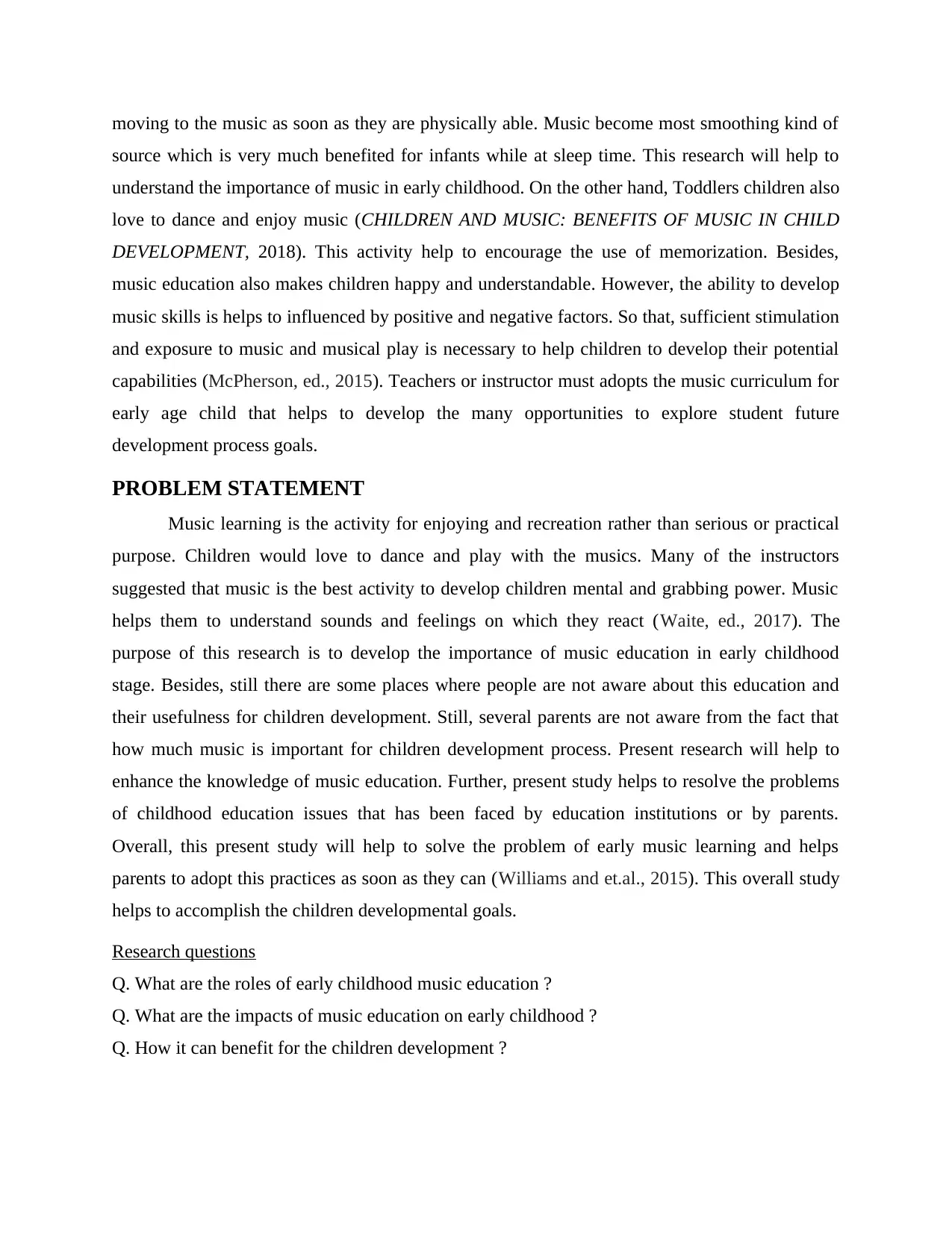
moving to the music as soon as they are physically able. Music become most smoothing kind of
source which is very much benefited for infants while at sleep time. This research will help to
understand the importance of music in early childhood. On the other hand, Toddlers children also
love to dance and enjoy music (CHILDREN AND MUSIC: BENEFITS OF MUSIC IN CHILD
DEVELOPMENT, 2018). This activity help to encourage the use of memorization. Besides,
music education also makes children happy and understandable. However, the ability to develop
music skills is helps to influenced by positive and negative factors. So that, sufficient stimulation
and exposure to music and musical play is necessary to help children to develop their potential
capabilities (McPherson, ed., 2015). Teachers or instructor must adopts the music curriculum for
early age child that helps to develop the many opportunities to explore student future
development process goals.
PROBLEM STATEMENT
Music learning is the activity for enjoying and recreation rather than serious or practical
purpose. Children would love to dance and play with the musics. Many of the instructors
suggested that music is the best activity to develop children mental and grabbing power. Music
helps them to understand sounds and feelings on which they react (Waite, ed., 2017). The
purpose of this research is to develop the importance of music education in early childhood
stage. Besides, still there are some places where people are not aware about this education and
their usefulness for children development. Still, several parents are not aware from the fact that
how much music is important for children development process. Present research will help to
enhance the knowledge of music education. Further, present study helps to resolve the problems
of childhood education issues that has been faced by education institutions or by parents.
Overall, this present study will help to solve the problem of early music learning and helps
parents to adopt this practices as soon as they can (Williams and et.al., 2015). This overall study
helps to accomplish the children developmental goals.
Research questions
Q. What are the roles of early childhood music education ?
Q. What are the impacts of music education on early childhood ?
Q. How it can benefit for the children development ?
source which is very much benefited for infants while at sleep time. This research will help to
understand the importance of music in early childhood. On the other hand, Toddlers children also
love to dance and enjoy music (CHILDREN AND MUSIC: BENEFITS OF MUSIC IN CHILD
DEVELOPMENT, 2018). This activity help to encourage the use of memorization. Besides,
music education also makes children happy and understandable. However, the ability to develop
music skills is helps to influenced by positive and negative factors. So that, sufficient stimulation
and exposure to music and musical play is necessary to help children to develop their potential
capabilities (McPherson, ed., 2015). Teachers or instructor must adopts the music curriculum for
early age child that helps to develop the many opportunities to explore student future
development process goals.
PROBLEM STATEMENT
Music learning is the activity for enjoying and recreation rather than serious or practical
purpose. Children would love to dance and play with the musics. Many of the instructors
suggested that music is the best activity to develop children mental and grabbing power. Music
helps them to understand sounds and feelings on which they react (Waite, ed., 2017). The
purpose of this research is to develop the importance of music education in early childhood
stage. Besides, still there are some places where people are not aware about this education and
their usefulness for children development. Still, several parents are not aware from the fact that
how much music is important for children development process. Present research will help to
enhance the knowledge of music education. Further, present study helps to resolve the problems
of childhood education issues that has been faced by education institutions or by parents.
Overall, this present study will help to solve the problem of early music learning and helps
parents to adopt this practices as soon as they can (Williams and et.al., 2015). This overall study
helps to accomplish the children developmental goals.
Research questions
Q. What are the roles of early childhood music education ?
Q. What are the impacts of music education on early childhood ?
Q. How it can benefit for the children development ?
Paraphrase This Document
Need a fresh take? Get an instant paraphrase of this document with our AI Paraphraser
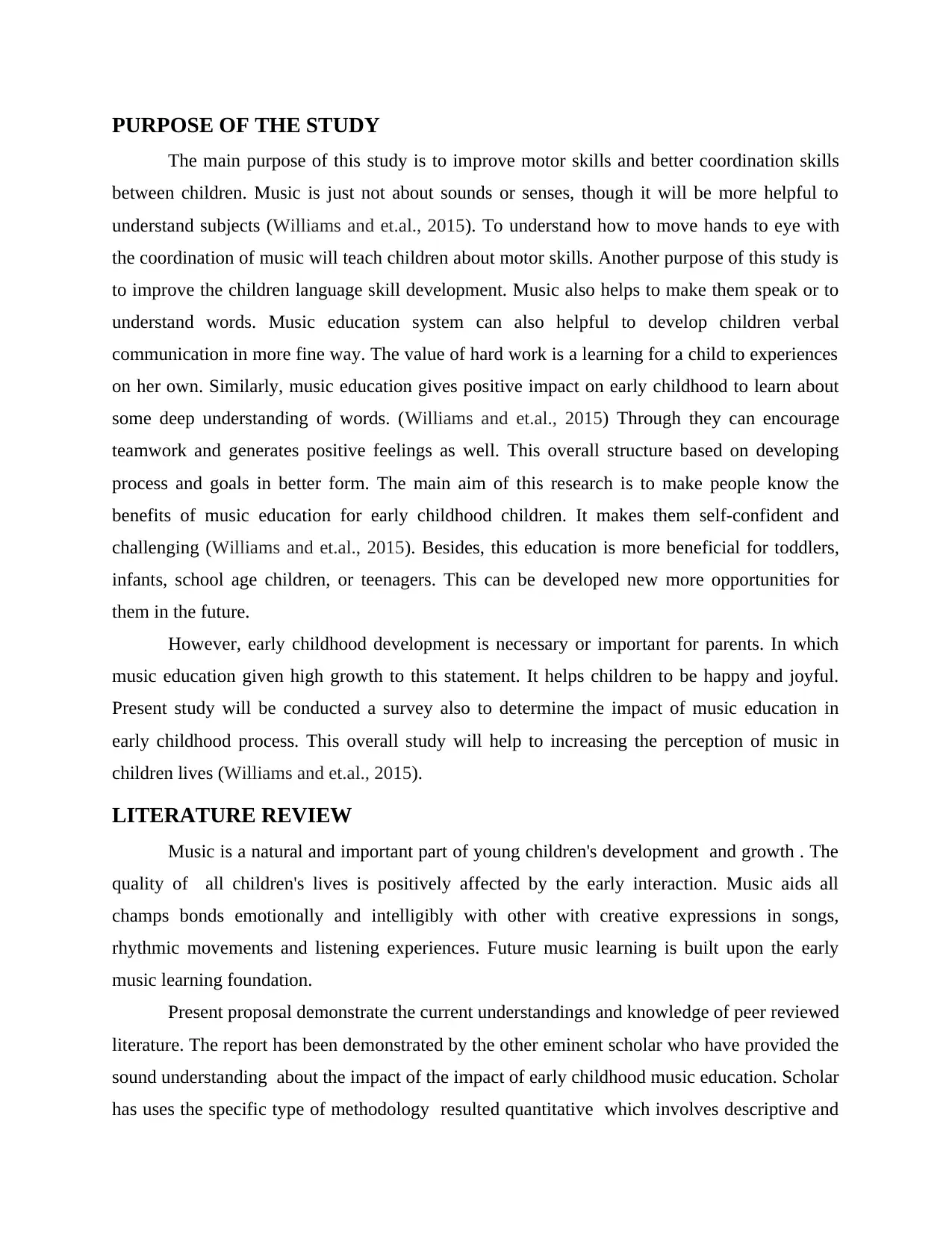
PURPOSE OF THE STUDY
The main purpose of this study is to improve motor skills and better coordination skills
between children. Music is just not about sounds or senses, though it will be more helpful to
understand subjects (Williams and et.al., 2015). To understand how to move hands to eye with
the coordination of music will teach children about motor skills. Another purpose of this study is
to improve the children language skill development. Music also helps to make them speak or to
understand words. Music education system can also helpful to develop children verbal
communication in more fine way. The value of hard work is a learning for a child to experiences
on her own. Similarly, music education gives positive impact on early childhood to learn about
some deep understanding of words. (Williams and et.al., 2015) Through they can encourage
teamwork and generates positive feelings as well. This overall structure based on developing
process and goals in better form. The main aim of this research is to make people know the
benefits of music education for early childhood children. It makes them self-confident and
challenging (Williams and et.al., 2015). Besides, this education is more beneficial for toddlers,
infants, school age children, or teenagers. This can be developed new more opportunities for
them in the future.
However, early childhood development is necessary or important for parents. In which
music education given high growth to this statement. It helps children to be happy and joyful.
Present study will be conducted a survey also to determine the impact of music education in
early childhood process. This overall study will help to increasing the perception of music in
children lives (Williams and et.al., 2015).
LITERATURE REVIEW
Music is a natural and important part of young children's development and growth . The
quality of all children's lives is positively affected by the early interaction. Music aids all
champs bonds emotionally and intelligibly with other with creative expressions in songs,
rhythmic movements and listening experiences. Future music learning is built upon the early
music learning foundation.
Present proposal demonstrate the current understandings and knowledge of peer reviewed
literature. The report has been demonstrated by the other eminent scholar who have provided the
sound understanding about the impact of the impact of early childhood music education. Scholar
has uses the specific type of methodology resulted quantitative which involves descriptive and
The main purpose of this study is to improve motor skills and better coordination skills
between children. Music is just not about sounds or senses, though it will be more helpful to
understand subjects (Williams and et.al., 2015). To understand how to move hands to eye with
the coordination of music will teach children about motor skills. Another purpose of this study is
to improve the children language skill development. Music also helps to make them speak or to
understand words. Music education system can also helpful to develop children verbal
communication in more fine way. The value of hard work is a learning for a child to experiences
on her own. Similarly, music education gives positive impact on early childhood to learn about
some deep understanding of words. (Williams and et.al., 2015) Through they can encourage
teamwork and generates positive feelings as well. This overall structure based on developing
process and goals in better form. The main aim of this research is to make people know the
benefits of music education for early childhood children. It makes them self-confident and
challenging (Williams and et.al., 2015). Besides, this education is more beneficial for toddlers,
infants, school age children, or teenagers. This can be developed new more opportunities for
them in the future.
However, early childhood development is necessary or important for parents. In which
music education given high growth to this statement. It helps children to be happy and joyful.
Present study will be conducted a survey also to determine the impact of music education in
early childhood process. This overall study will help to increasing the perception of music in
children lives (Williams and et.al., 2015).
LITERATURE REVIEW
Music is a natural and important part of young children's development and growth . The
quality of all children's lives is positively affected by the early interaction. Music aids all
champs bonds emotionally and intelligibly with other with creative expressions in songs,
rhythmic movements and listening experiences. Future music learning is built upon the early
music learning foundation.
Present proposal demonstrate the current understandings and knowledge of peer reviewed
literature. The report has been demonstrated by the other eminent scholar who have provided the
sound understanding about the impact of the impact of early childhood music education. Scholar
has uses the specific type of methodology resulted quantitative which involves descriptive and
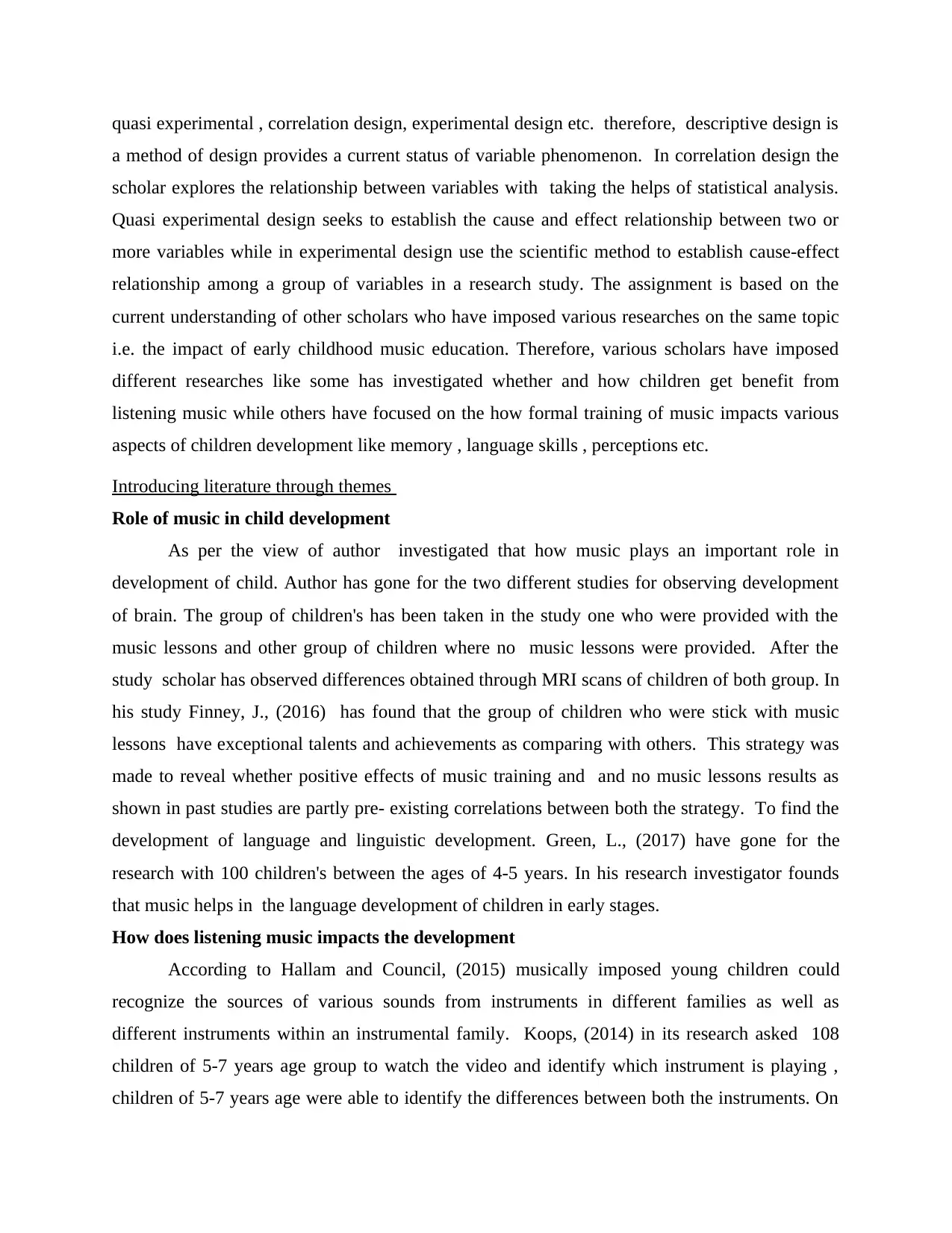
quasi experimental , correlation design, experimental design etc. therefore, descriptive design is
a method of design provides a current status of variable phenomenon. In correlation design the
scholar explores the relationship between variables with taking the helps of statistical analysis.
Quasi experimental design seeks to establish the cause and effect relationship between two or
more variables while in experimental design use the scientific method to establish cause-effect
relationship among a group of variables in a research study. The assignment is based on the
current understanding of other scholars who have imposed various researches on the same topic
i.e. the impact of early childhood music education. Therefore, various scholars have imposed
different researches like some has investigated whether and how children get benefit from
listening music while others have focused on the how formal training of music impacts various
aspects of children development like memory , language skills , perceptions etc.
Introducing literature through themes
Role of music in child development
As per the view of author investigated that how music plays an important role in
development of child. Author has gone for the two different studies for observing development
of brain. The group of children's has been taken in the study one who were provided with the
music lessons and other group of children where no music lessons were provided. After the
study scholar has observed differences obtained through MRI scans of children of both group. In
his study Finney, J., (2016) has found that the group of children who were stick with music
lessons have exceptional talents and achievements as comparing with others. This strategy was
made to reveal whether positive effects of music training and and no music lessons results as
shown in past studies are partly pre- existing correlations between both the strategy. To find the
development of language and linguistic development. Green, L., (2017) have gone for the
research with 100 children's between the ages of 4-5 years. In his research investigator founds
that music helps in the language development of children in early stages.
How does listening music impacts the development
According to Hallam and Council, (2015) musically imposed young children could
recognize the sources of various sounds from instruments in different families as well as
different instruments within an instrumental family. Koops, (2014) in its research asked 108
children of 5-7 years age group to watch the video and identify which instrument is playing ,
children of 5-7 years age were able to identify the differences between both the instruments. On
a method of design provides a current status of variable phenomenon. In correlation design the
scholar explores the relationship between variables with taking the helps of statistical analysis.
Quasi experimental design seeks to establish the cause and effect relationship between two or
more variables while in experimental design use the scientific method to establish cause-effect
relationship among a group of variables in a research study. The assignment is based on the
current understanding of other scholars who have imposed various researches on the same topic
i.e. the impact of early childhood music education. Therefore, various scholars have imposed
different researches like some has investigated whether and how children get benefit from
listening music while others have focused on the how formal training of music impacts various
aspects of children development like memory , language skills , perceptions etc.
Introducing literature through themes
Role of music in child development
As per the view of author investigated that how music plays an important role in
development of child. Author has gone for the two different studies for observing development
of brain. The group of children's has been taken in the study one who were provided with the
music lessons and other group of children where no music lessons were provided. After the
study scholar has observed differences obtained through MRI scans of children of both group. In
his study Finney, J., (2016) has found that the group of children who were stick with music
lessons have exceptional talents and achievements as comparing with others. This strategy was
made to reveal whether positive effects of music training and and no music lessons results as
shown in past studies are partly pre- existing correlations between both the strategy. To find the
development of language and linguistic development. Green, L., (2017) have gone for the
research with 100 children's between the ages of 4-5 years. In his research investigator founds
that music helps in the language development of children in early stages.
How does listening music impacts the development
According to Hallam and Council, (2015) musically imposed young children could
recognize the sources of various sounds from instruments in different families as well as
different instruments within an instrumental family. Koops, (2014) in its research asked 108
children of 5-7 years age group to watch the video and identify which instrument is playing ,
children of 5-7 years age were able to identify the differences between both the instruments. On
⊘ This is a preview!⊘
Do you want full access?
Subscribe today to unlock all pages.

Trusted by 1+ million students worldwide
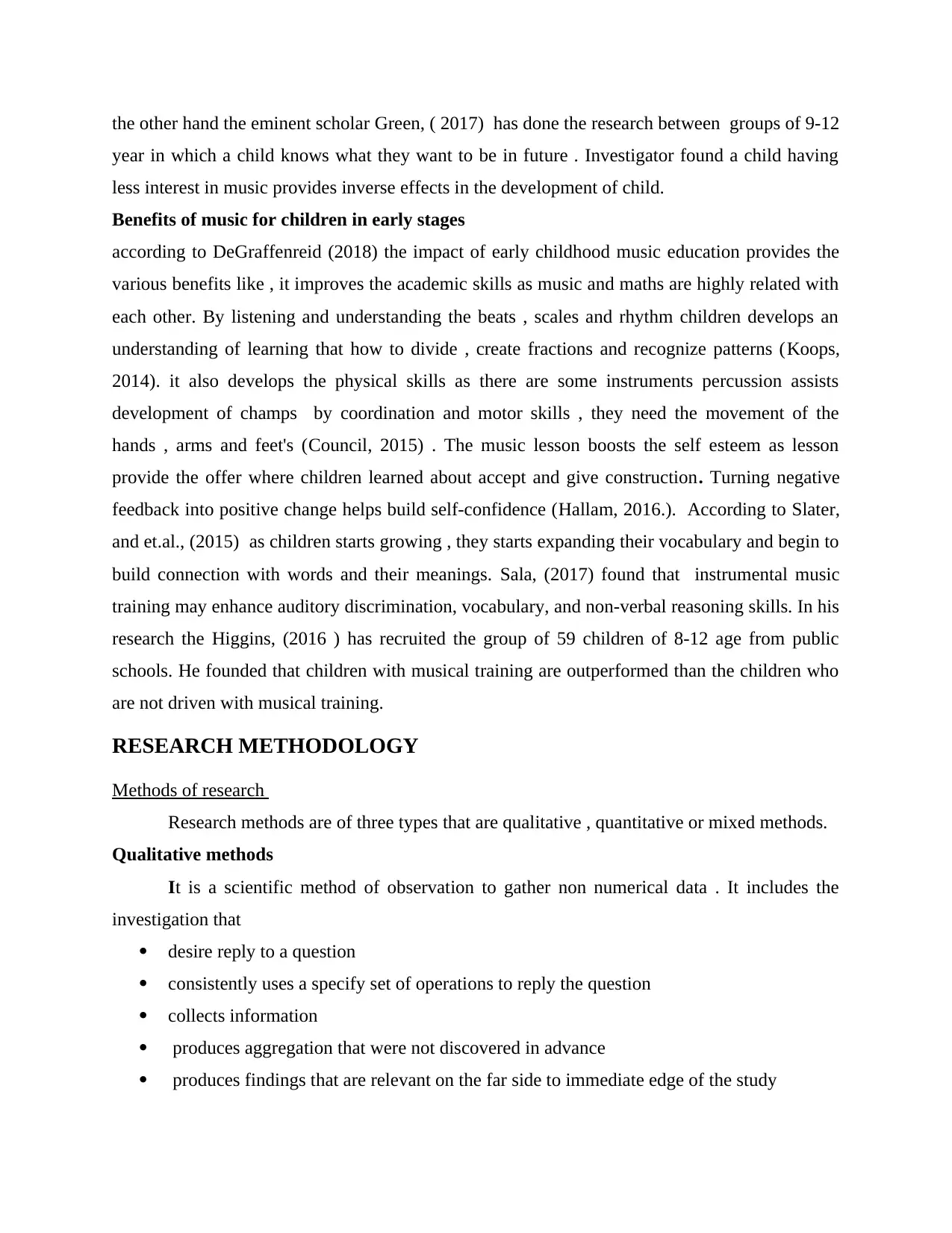
the other hand the eminent scholar Green, ( 2017) has done the research between groups of 9-12
year in which a child knows what they want to be in future . Investigator found a child having
less interest in music provides inverse effects in the development of child.
Benefits of music for children in early stages
according to DeGraffenreid (2018) the impact of early childhood music education provides the
various benefits like , it improves the academic skills as music and maths are highly related with
each other. By listening and understanding the beats , scales and rhythm children develops an
understanding of learning that how to divide , create fractions and recognize patterns (Koops,
2014). it also develops the physical skills as there are some instruments percussion assists
development of champs by coordination and motor skills , they need the movement of the
hands , arms and feet's (Council, 2015) . The music lesson boosts the self esteem as lesson
provide the offer where children learned about accept and give construction. Turning negative
feedback into positive change helps build self-confidence (Hallam, 2016.). According to Slater,
and et.al., (2015) as children starts growing , they starts expanding their vocabulary and begin to
build connection with words and their meanings. Sala, (2017) found that instrumental music
training may enhance auditory discrimination, vocabulary, and non-verbal reasoning skills. In his
research the Higgins, (2016 ) has recruited the group of 59 children of 8-12 age from public
schools. He founded that children with musical training are outperformed than the children who
are not driven with musical training.
RESEARCH METHODOLOGY
Methods of research
Research methods are of three types that are qualitative , quantitative or mixed methods.
Qualitative methods
It is a scientific method of observation to gather non numerical data . It includes the
investigation that
desire reply to a question
consistently uses a specify set of operations to reply the question
collects information
produces aggregation that were not discovered in advance
produces findings that are relevant on the far side to immediate edge of the study
year in which a child knows what they want to be in future . Investigator found a child having
less interest in music provides inverse effects in the development of child.
Benefits of music for children in early stages
according to DeGraffenreid (2018) the impact of early childhood music education provides the
various benefits like , it improves the academic skills as music and maths are highly related with
each other. By listening and understanding the beats , scales and rhythm children develops an
understanding of learning that how to divide , create fractions and recognize patterns (Koops,
2014). it also develops the physical skills as there are some instruments percussion assists
development of champs by coordination and motor skills , they need the movement of the
hands , arms and feet's (Council, 2015) . The music lesson boosts the self esteem as lesson
provide the offer where children learned about accept and give construction. Turning negative
feedback into positive change helps build self-confidence (Hallam, 2016.). According to Slater,
and et.al., (2015) as children starts growing , they starts expanding their vocabulary and begin to
build connection with words and their meanings. Sala, (2017) found that instrumental music
training may enhance auditory discrimination, vocabulary, and non-verbal reasoning skills. In his
research the Higgins, (2016 ) has recruited the group of 59 children of 8-12 age from public
schools. He founded that children with musical training are outperformed than the children who
are not driven with musical training.
RESEARCH METHODOLOGY
Methods of research
Research methods are of three types that are qualitative , quantitative or mixed methods.
Qualitative methods
It is a scientific method of observation to gather non numerical data . It includes the
investigation that
desire reply to a question
consistently uses a specify set of operations to reply the question
collects information
produces aggregation that were not discovered in advance
produces findings that are relevant on the far side to immediate edge of the study
Paraphrase This Document
Need a fresh take? Get an instant paraphrase of this document with our AI Paraphraser
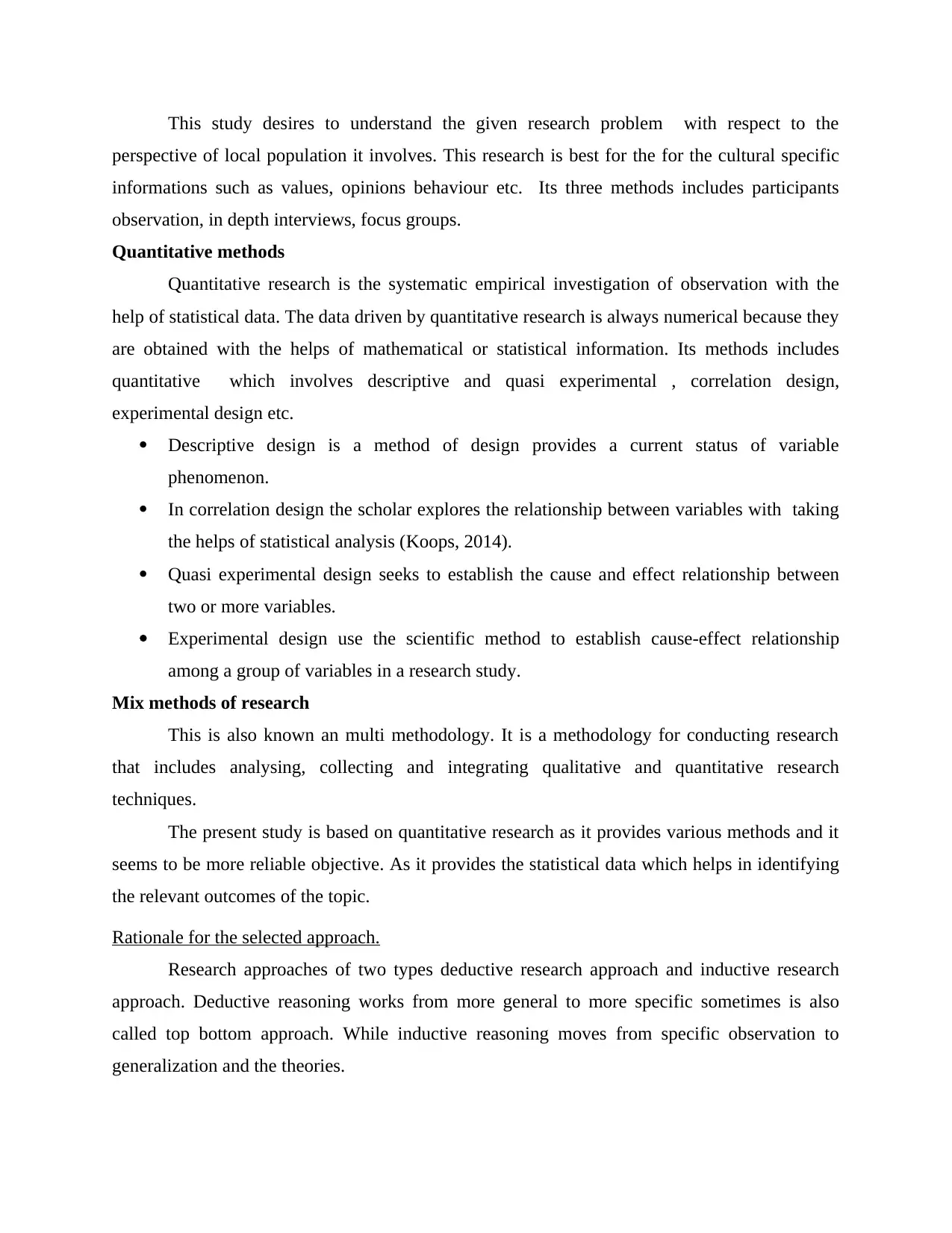
This study desires to understand the given research problem with respect to the
perspective of local population it involves. This research is best for the for the cultural specific
informations such as values, opinions behaviour etc. Its three methods includes participants
observation, in depth interviews, focus groups.
Quantitative methods
Quantitative research is the systematic empirical investigation of observation with the
help of statistical data. The data driven by quantitative research is always numerical because they
are obtained with the helps of mathematical or statistical information. Its methods includes
quantitative which involves descriptive and quasi experimental , correlation design,
experimental design etc.
Descriptive design is a method of design provides a current status of variable
phenomenon.
In correlation design the scholar explores the relationship between variables with taking
the helps of statistical analysis (Koops, 2014).
Quasi experimental design seeks to establish the cause and effect relationship between
two or more variables.
Experimental design use the scientific method to establish cause-effect relationship
among a group of variables in a research study.
Mix methods of research
This is also known an multi methodology. It is a methodology for conducting research
that includes analysing, collecting and integrating qualitative and quantitative research
techniques.
The present study is based on quantitative research as it provides various methods and it
seems to be more reliable objective. As it provides the statistical data which helps in identifying
the relevant outcomes of the topic.
Rationale for the selected approach.
Research approaches of two types deductive research approach and inductive research
approach. Deductive reasoning works from more general to more specific sometimes is also
called top bottom approach. While inductive reasoning moves from specific observation to
generalization and the theories.
perspective of local population it involves. This research is best for the for the cultural specific
informations such as values, opinions behaviour etc. Its three methods includes participants
observation, in depth interviews, focus groups.
Quantitative methods
Quantitative research is the systematic empirical investigation of observation with the
help of statistical data. The data driven by quantitative research is always numerical because they
are obtained with the helps of mathematical or statistical information. Its methods includes
quantitative which involves descriptive and quasi experimental , correlation design,
experimental design etc.
Descriptive design is a method of design provides a current status of variable
phenomenon.
In correlation design the scholar explores the relationship between variables with taking
the helps of statistical analysis (Koops, 2014).
Quasi experimental design seeks to establish the cause and effect relationship between
two or more variables.
Experimental design use the scientific method to establish cause-effect relationship
among a group of variables in a research study.
Mix methods of research
This is also known an multi methodology. It is a methodology for conducting research
that includes analysing, collecting and integrating qualitative and quantitative research
techniques.
The present study is based on quantitative research as it provides various methods and it
seems to be more reliable objective. As it provides the statistical data which helps in identifying
the relevant outcomes of the topic.
Rationale for the selected approach.
Research approaches of two types deductive research approach and inductive research
approach. Deductive reasoning works from more general to more specific sometimes is also
called top bottom approach. While inductive reasoning moves from specific observation to
generalization and the theories.
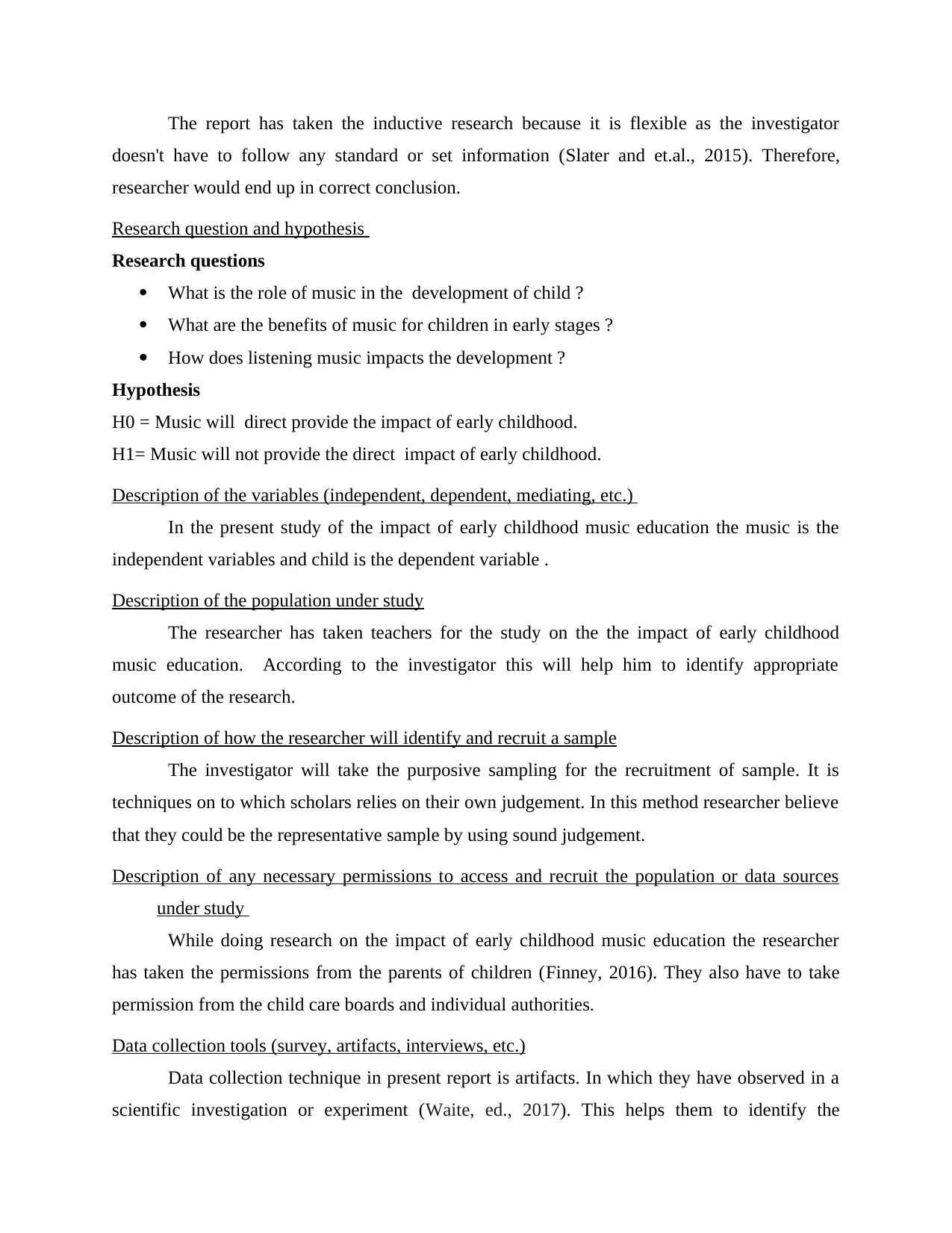
The report has taken the inductive research because it is flexible as the investigator
doesn't have to follow any standard or set information (Slater and et.al., 2015). Therefore,
researcher would end up in correct conclusion.
Research question and hypothesis
Research questions
What is the role of music in the development of child ?
What are the benefits of music for children in early stages ?
How does listening music impacts the development ?
Hypothesis
H0 = Music will direct provide the impact of early childhood.
H1= Music will not provide the direct impact of early childhood.
Description of the variables (independent, dependent, mediating, etc.)
In the present study of the impact of early childhood music education the music is the
independent variables and child is the dependent variable .
Description of the population under study
The researcher has taken teachers for the study on the the impact of early childhood
music education. According to the investigator this will help him to identify appropriate
outcome of the research.
Description of how the researcher will identify and recruit a sample
The investigator will take the purposive sampling for the recruitment of sample. It is
techniques on to which scholars relies on their own judgement. In this method researcher believe
that they could be the representative sample by using sound judgement.
Description of any necessary permissions to access and recruit the population or data sources
under study
While doing research on the impact of early childhood music education the researcher
has taken the permissions from the parents of children (Finney, 2016). They also have to take
permission from the child care boards and individual authorities.
Data collection tools (survey, artifacts, interviews, etc.)
Data collection technique in present report is artifacts. In which they have observed in a
scientific investigation or experiment (Waite, ed., 2017). This helps them to identify the
doesn't have to follow any standard or set information (Slater and et.al., 2015). Therefore,
researcher would end up in correct conclusion.
Research question and hypothesis
Research questions
What is the role of music in the development of child ?
What are the benefits of music for children in early stages ?
How does listening music impacts the development ?
Hypothesis
H0 = Music will direct provide the impact of early childhood.
H1= Music will not provide the direct impact of early childhood.
Description of the variables (independent, dependent, mediating, etc.)
In the present study of the impact of early childhood music education the music is the
independent variables and child is the dependent variable .
Description of the population under study
The researcher has taken teachers for the study on the the impact of early childhood
music education. According to the investigator this will help him to identify appropriate
outcome of the research.
Description of how the researcher will identify and recruit a sample
The investigator will take the purposive sampling for the recruitment of sample. It is
techniques on to which scholars relies on their own judgement. In this method researcher believe
that they could be the representative sample by using sound judgement.
Description of any necessary permissions to access and recruit the population or data sources
under study
While doing research on the impact of early childhood music education the researcher
has taken the permissions from the parents of children (Finney, 2016). They also have to take
permission from the child care boards and individual authorities.
Data collection tools (survey, artifacts, interviews, etc.)
Data collection technique in present report is artifacts. In which they have observed in a
scientific investigation or experiment (Waite, ed., 2017). This helps them to identify the
⊘ This is a preview!⊘
Do you want full access?
Subscribe today to unlock all pages.

Trusted by 1+ million students worldwide
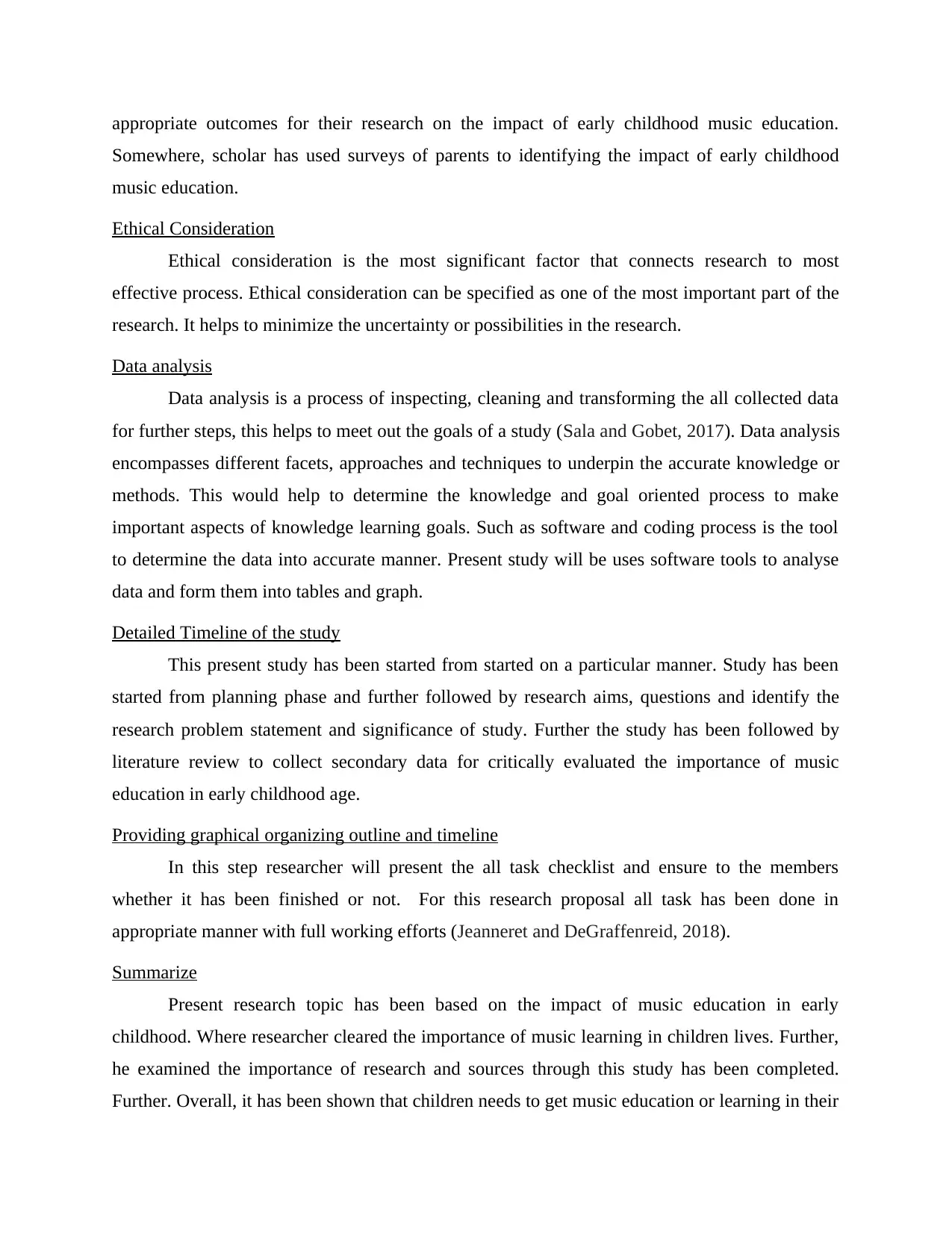
appropriate outcomes for their research on the impact of early childhood music education.
Somewhere, scholar has used surveys of parents to identifying the impact of early childhood
music education.
Ethical Consideration
Ethical consideration is the most significant factor that connects research to most
effective process. Ethical consideration can be specified as one of the most important part of the
research. It helps to minimize the uncertainty or possibilities in the research.
Data analysis
Data analysis is a process of inspecting, cleaning and transforming the all collected data
for further steps, this helps to meet out the goals of a study (Sala and Gobet, 2017). Data analysis
encompasses different facets, approaches and techniques to underpin the accurate knowledge or
methods. This would help to determine the knowledge and goal oriented process to make
important aspects of knowledge learning goals. Such as software and coding process is the tool
to determine the data into accurate manner. Present study will be uses software tools to analyse
data and form them into tables and graph.
Detailed Timeline of the study
This present study has been started from started on a particular manner. Study has been
started from planning phase and further followed by research aims, questions and identify the
research problem statement and significance of study. Further the study has been followed by
literature review to collect secondary data for critically evaluated the importance of music
education in early childhood age.
Providing graphical organizing outline and timeline
In this step researcher will present the all task checklist and ensure to the members
whether it has been finished or not. For this research proposal all task has been done in
appropriate manner with full working efforts (Jeanneret and DeGraffenreid, 2018).
Summarize
Present research topic has been based on the impact of music education in early
childhood. Where researcher cleared the importance of music learning in children lives. Further,
he examined the importance of research and sources through this study has been completed.
Further. Overall, it has been shown that children needs to get music education or learning in their
Somewhere, scholar has used surveys of parents to identifying the impact of early childhood
music education.
Ethical Consideration
Ethical consideration is the most significant factor that connects research to most
effective process. Ethical consideration can be specified as one of the most important part of the
research. It helps to minimize the uncertainty or possibilities in the research.
Data analysis
Data analysis is a process of inspecting, cleaning and transforming the all collected data
for further steps, this helps to meet out the goals of a study (Sala and Gobet, 2017). Data analysis
encompasses different facets, approaches and techniques to underpin the accurate knowledge or
methods. This would help to determine the knowledge and goal oriented process to make
important aspects of knowledge learning goals. Such as software and coding process is the tool
to determine the data into accurate manner. Present study will be uses software tools to analyse
data and form them into tables and graph.
Detailed Timeline of the study
This present study has been started from started on a particular manner. Study has been
started from planning phase and further followed by research aims, questions and identify the
research problem statement and significance of study. Further the study has been followed by
literature review to collect secondary data for critically evaluated the importance of music
education in early childhood age.
Providing graphical organizing outline and timeline
In this step researcher will present the all task checklist and ensure to the members
whether it has been finished or not. For this research proposal all task has been done in
appropriate manner with full working efforts (Jeanneret and DeGraffenreid, 2018).
Summarize
Present research topic has been based on the impact of music education in early
childhood. Where researcher cleared the importance of music learning in children lives. Further,
he examined the importance of research and sources through this study has been completed.
Further. Overall, it has been shown that children needs to get music education or learning in their
Paraphrase This Document
Need a fresh take? Get an instant paraphrase of this document with our AI Paraphraser
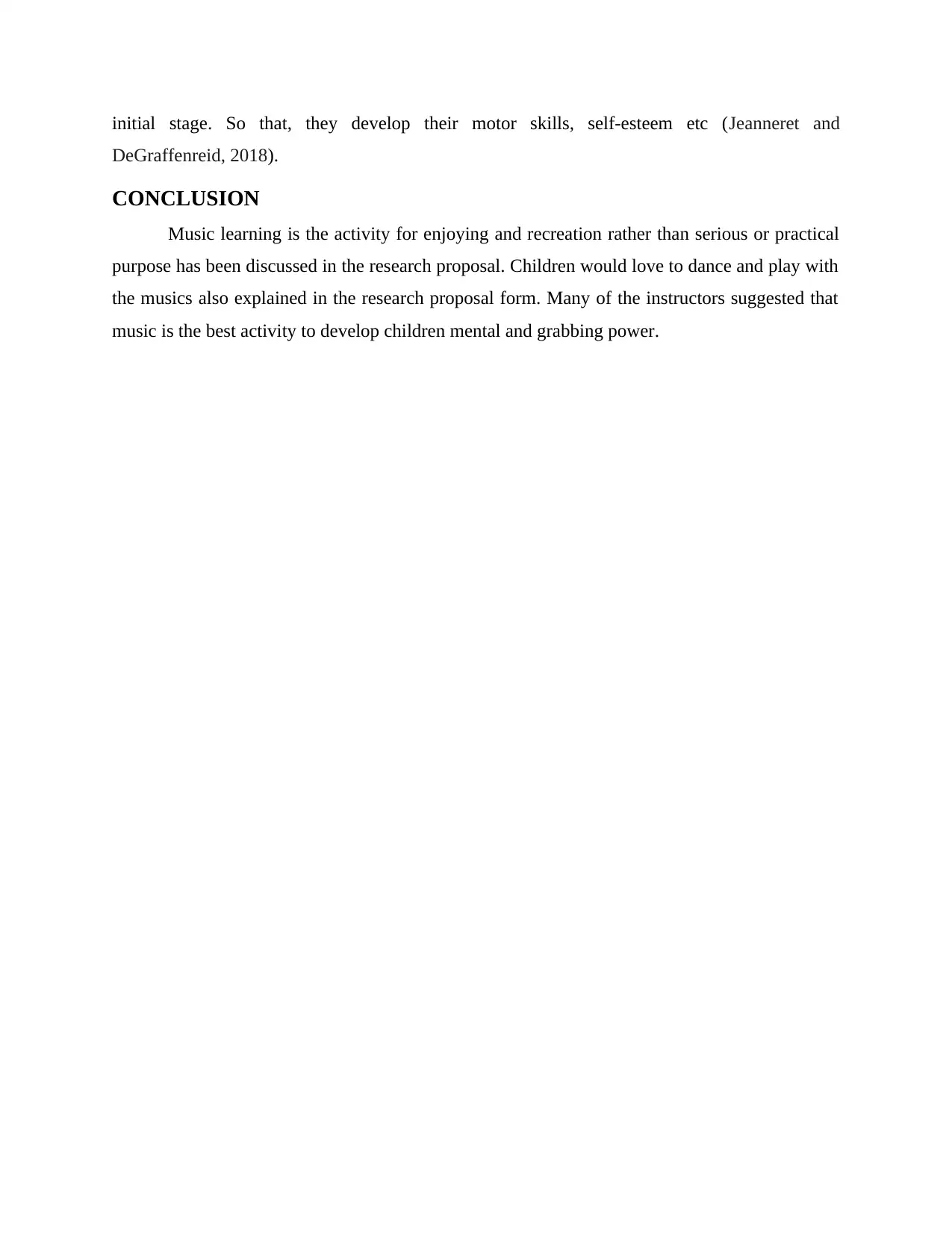
initial stage. So that, they develop their motor skills, self-esteem etc (Jeanneret and
DeGraffenreid, 2018).
CONCLUSION
Music learning is the activity for enjoying and recreation rather than serious or practical
purpose has been discussed in the research proposal. Children would love to dance and play with
the musics also explained in the research proposal form. Many of the instructors suggested that
music is the best activity to develop children mental and grabbing power.
DeGraffenreid, 2018).
CONCLUSION
Music learning is the activity for enjoying and recreation rather than serious or practical
purpose has been discussed in the research proposal. Children would love to dance and play with
the musics also explained in the research proposal form. Many of the instructors suggested that
music is the best activity to develop children mental and grabbing power.
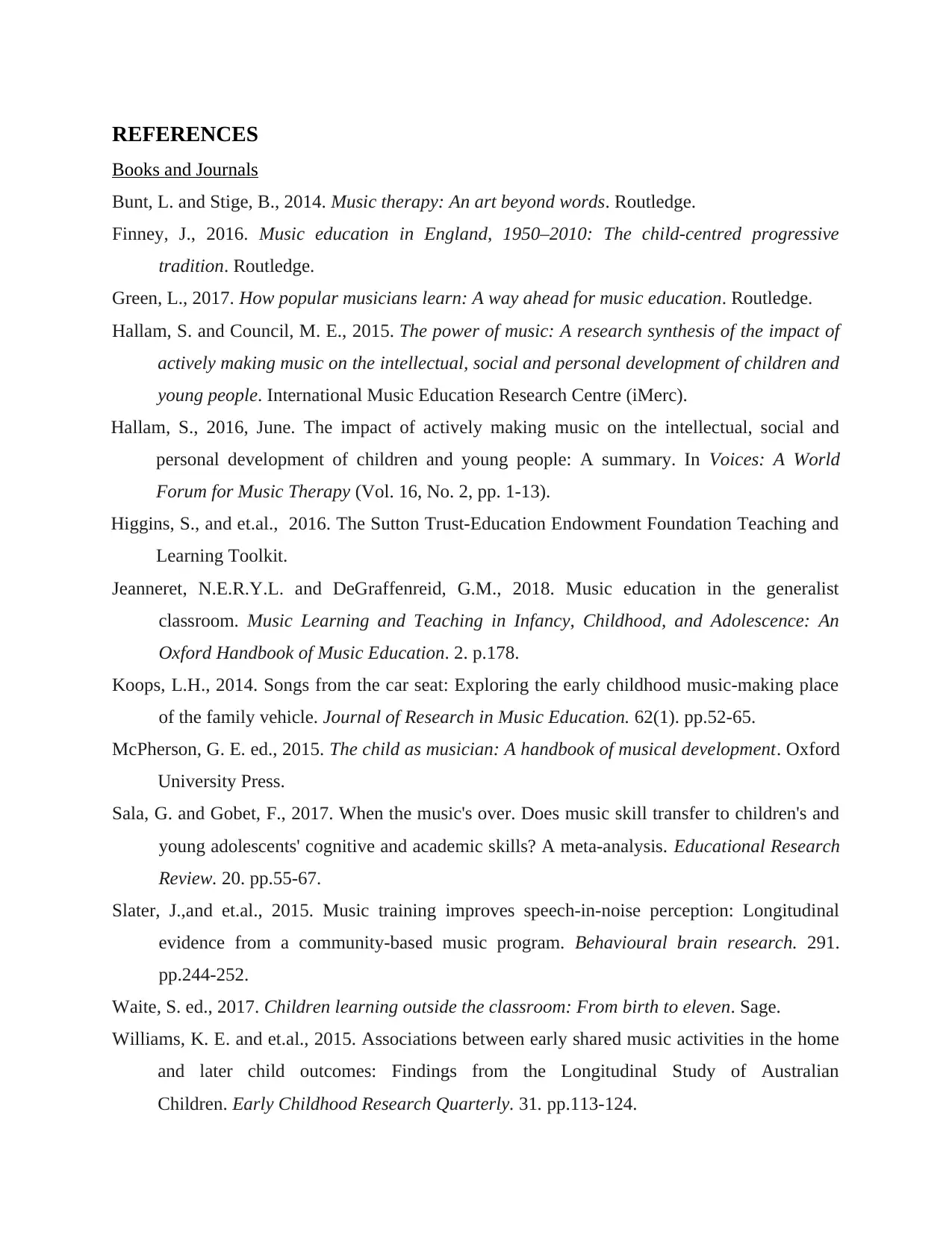
REFERENCES
Books and Journals
Bunt, L. and Stige, B., 2014. Music therapy: An art beyond words. Routledge.
Finney, J., 2016. Music education in England, 1950–2010: The child-centred progressive
tradition. Routledge.
Green, L., 2017. How popular musicians learn: A way ahead for music education. Routledge.
Hallam, S. and Council, M. E., 2015. The power of music: A research synthesis of the impact of
actively making music on the intellectual, social and personal development of children and
young people. International Music Education Research Centre (iMerc).
Hallam, S., 2016, June. The impact of actively making music on the intellectual, social and
personal development of children and young people: A summary. In Voices: A World
Forum for Music Therapy (Vol. 16, No. 2, pp. 1-13).
Higgins, S., and et.al., 2016. The Sutton Trust-Education Endowment Foundation Teaching and
Learning Toolkit.
Jeanneret, N.E.R.Y.L. and DeGraffenreid, G.M., 2018. Music education in the generalist
classroom. Music Learning and Teaching in Infancy, Childhood, and Adolescence: An
Oxford Handbook of Music Education. 2. p.178.
Koops, L.H., 2014. Songs from the car seat: Exploring the early childhood music-making place
of the family vehicle. Journal of Research in Music Education. 62(1). pp.52-65.
McPherson, G. E. ed., 2015. The child as musician: A handbook of musical development. Oxford
University Press.
Sala, G. and Gobet, F., 2017. When the music's over. Does music skill transfer to children's and
young adolescents' cognitive and academic skills? A meta-analysis. Educational Research
Review. 20. pp.55-67.
Slater, J.,and et.al., 2015. Music training improves speech-in-noise perception: Longitudinal
evidence from a community-based music program. Behavioural brain research. 291.
pp.244-252.
Waite, S. ed., 2017. Children learning outside the classroom: From birth to eleven. Sage.
Williams, K. E. and et.al., 2015. Associations between early shared music activities in the home
and later child outcomes: Findings from the Longitudinal Study of Australian
Children. Early Childhood Research Quarterly. 31. pp.113-124.
Books and Journals
Bunt, L. and Stige, B., 2014. Music therapy: An art beyond words. Routledge.
Finney, J., 2016. Music education in England, 1950–2010: The child-centred progressive
tradition. Routledge.
Green, L., 2017. How popular musicians learn: A way ahead for music education. Routledge.
Hallam, S. and Council, M. E., 2015. The power of music: A research synthesis of the impact of
actively making music on the intellectual, social and personal development of children and
young people. International Music Education Research Centre (iMerc).
Hallam, S., 2016, June. The impact of actively making music on the intellectual, social and
personal development of children and young people: A summary. In Voices: A World
Forum for Music Therapy (Vol. 16, No. 2, pp. 1-13).
Higgins, S., and et.al., 2016. The Sutton Trust-Education Endowment Foundation Teaching and
Learning Toolkit.
Jeanneret, N.E.R.Y.L. and DeGraffenreid, G.M., 2018. Music education in the generalist
classroom. Music Learning and Teaching in Infancy, Childhood, and Adolescence: An
Oxford Handbook of Music Education. 2. p.178.
Koops, L.H., 2014. Songs from the car seat: Exploring the early childhood music-making place
of the family vehicle. Journal of Research in Music Education. 62(1). pp.52-65.
McPherson, G. E. ed., 2015. The child as musician: A handbook of musical development. Oxford
University Press.
Sala, G. and Gobet, F., 2017. When the music's over. Does music skill transfer to children's and
young adolescents' cognitive and academic skills? A meta-analysis. Educational Research
Review. 20. pp.55-67.
Slater, J.,and et.al., 2015. Music training improves speech-in-noise perception: Longitudinal
evidence from a community-based music program. Behavioural brain research. 291.
pp.244-252.
Waite, S. ed., 2017. Children learning outside the classroom: From birth to eleven. Sage.
Williams, K. E. and et.al., 2015. Associations between early shared music activities in the home
and later child outcomes: Findings from the Longitudinal Study of Australian
Children. Early Childhood Research Quarterly. 31. pp.113-124.
⊘ This is a preview!⊘
Do you want full access?
Subscribe today to unlock all pages.

Trusted by 1+ million students worldwide
1 out of 13
Related Documents
Your All-in-One AI-Powered Toolkit for Academic Success.
+13062052269
info@desklib.com
Available 24*7 on WhatsApp / Email
![[object Object]](/_next/static/media/star-bottom.7253800d.svg)
Unlock your academic potential
Copyright © 2020–2026 A2Z Services. All Rights Reserved. Developed and managed by ZUCOL.




